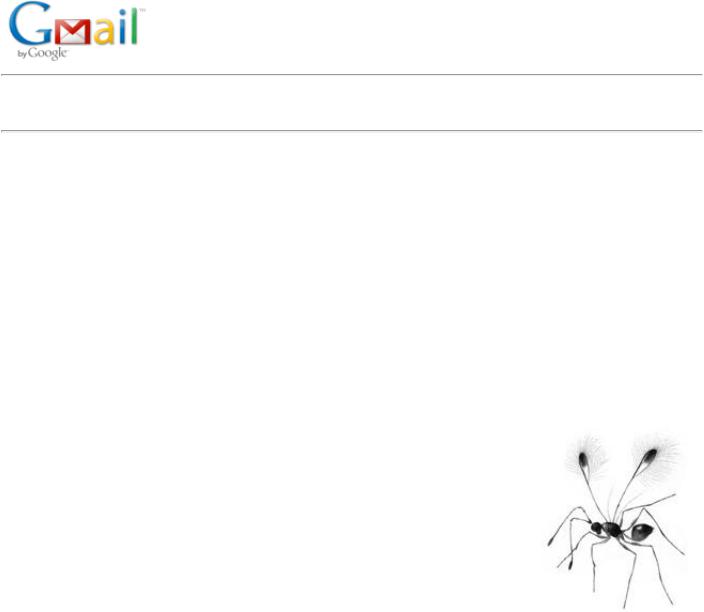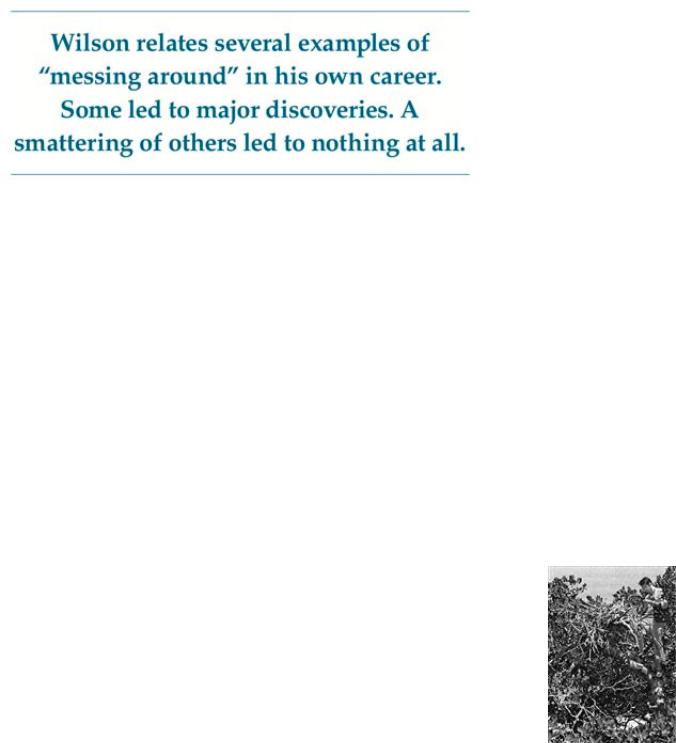
What Makes a Good Scientist
.pdf
9.4.2014 |
Gmail - What Makes a Good Scientist? |
|
Иоаким Хабибуллин <khabibullinioakim@gmail.com> |
What Makes a Good Scientist?
1 письмо
akimati14@yandex.ru <akimati14@yandex.ru> 1 октября 2013 г., 2:13 Кому: khabibullinioakim@gmail.com
akimati14@yandex.ru thought you might be interested in this article from American Scientist Online.
BOOK REVIEW
What Makes a Good Scientist?
Katie L. Burke
LETTERS TO A YOUNG SCIENTIST. Edward O. Wilson. 244 pp. W. W. Norton and Company, 2013. $21.95.
 Part memoir and part advice column for budding scientists, Edward O. Wilson’s Letters to a Young Scientist is short on practical advice and long on philosophical maxims—as it should be. During his long and highly successful career, Wilson has advised numerous doctoral students and helped them launch their careers. Along the way, he has developed a strong sense of what it takes to thrive in the realm of science.
Part memoir and part advice column for budding scientists, Edward O. Wilson’s Letters to a Young Scientist is short on practical advice and long on philosophical maxims—as it should be. During his long and highly successful career, Wilson has advised numerous doctoral students and helped them launch their careers. Along the way, he has developed a strong sense of what it takes to thrive in the realm of science.
Nevertheless, the routes to success have changed in notable ways since the 1940s, when Wilson embarked on his career. He gives no specific advice on how to find employment in today’s hypercompetitive world of biology, largely because he can’t. Wilson acknowledges this limitation in the book’s first chapter: “I grew up in a
different age. You, in contrast, are well into a different era, where opportunity is broader but more demanding.” Those looking for practical advice about the job market would be better served seeking counsel from those who have more recently experienced it. Instead, he builds his book around a more fundamental and timeless career question: What makes a good scientist?
As Wilson works toward an answer, he backs up his arguments with firsthand evidence. It is obvious that he deeply appreciates the creativity of the scientific process. In his first few chapters, he encourages the reader to daydream, work hard, and mess around. Wilson relates several examples of “messing around” in his own career. Some led to major discoveries—for example, developing a new “chilling and mixing” method for swapping ant queens of different species to determine whether trait differences are genetically determined. A smattering of others led to nothing at all, as when he checked to see if a powerful magnet held near an ant trail influenced their navigation (it didn’t). Quick, uncontrolled experiments open the potential for major discovery without committing much time in case they fail.
https://mail.google.com/mail/u/0/?ui=2&ik=c92eb8380e&view=pt&cat=scientifical%20pages&search=cat&th=14170eea78fcc3… 1/3

9.4.2014 |
Gmail - What Makes a Good Scientist? |
I found Wilson’s writings on the importance of failure especially affecting. Most young scientists are not prepared for the level and number of setbacks they are likely to encounter in their early careers. As scientific funding has been cut and tenuretrack jobs have grown scarce, today’s young scientists will be rejected more than any scientists of equal caliber in the past century. “Be prepared mentally for some amount of chaos and failure. Waste and frustration often attend the earliest stages,” Wilson writes. He illustrates this warning with the story of one of his greatest disappointments, a failed search for the “dawn ant,” the ancestor of all modern ant species and the mysterious missing link to understanding the evolution of social behavior.
Graduate students will inevitably encounter failed experiments, failed teachable moments in the classroom, and time spent on research that never gets funded or never comes to fruition. Wilson counsels patience: “A strong work ethic is absolutely essential. There must be an ability to pass long hours in study and research with pleasure even though some of the effort will inevitably lead to dead ends.” Time that is seemingly wasted may later prove to have been well spent. Wilson asserts that the process of exploring and gaining intimacy with one’s studies—even the ones that don’t go as planned—is essential to the creative process of a scientist.
In the popular view, a successful scientist must be brilliant, skilled in mathematics, and impeccably precise. Wilson debunks this myth. He argues that entrepreneurship trumps brilliance; that shortcomings in mathematics can be overcome by identifying good, mathematically inclined collaborators; and that the most important part of the scientific process is messing around with your system to see if you notice something no one else has noticed.
 Continuing his exploration of what helps a scientist flourish, Wilson resorts to broad generalizations to describe the scientific personality. Scientists, he claims, tend to be introverted and prone to daydreaming. They reject authority and therefore dislike being told what to do. Their attention wanders. This pigeonholing made me uncomfortable, because I think science benefits from incorporating a diversity of personalities. It should allow room for extroverts, individuals who are highly focused, and those who willingly take on leadership roles. That said, I’ll admit that his description of the scientific personality fits me to a T, and it fits many of the scientists whom I respect the most.
Continuing his exploration of what helps a scientist flourish, Wilson resorts to broad generalizations to describe the scientific personality. Scientists, he claims, tend to be introverted and prone to daydreaming. They reject authority and therefore dislike being told what to do. Their attention wanders. This pigeonholing made me uncomfortable, because I think science benefits from incorporating a diversity of personalities. It should allow room for extroverts, individuals who are highly focused, and those who willingly take on leadership roles. That said, I’ll admit that his description of the scientific personality fits me to a T, and it fits many of the scientists whom I respect the most.
Wilson concludes by enumerating the big questions that inspire him—those that define the cutting edge of his field of biology and those that point to promising new directions for research. With the enthusiasm of a true devotee to the art of inquiry, Wilson contends that there is no higher calling than filling those gaping holes in our knowledge:
Ponder these questions for a while: How do pond, mountaintop, desert, and rain forest ecosystems really work? What holds them together? Under what pressures do they sometimes disintegrate, and how and why? In fact, many are crumbling. Humanity’s longterm survival depends on acquiring answers to these and many other related questions about our home planet. Time is growing short. We need a larger scientific effort, and many more scientists in all disciplines. Now I’ll repeat what I’ve said when I began these letters: you are needed.
My immediate response to his message was jaded but perhaps typical of a generation of young scientists who came of age during the Great Recession. Having watched funding for science and higher education in steady decline over the past five years, I wanted to reply, “Tell that to Congress, Dr. Wilson.”
Katie L. Burke is an associate editor at American Scientist. She received her Ph.D. in biology from the University of Virginia in 2011. She blogs about ecology at http://theunderstory.com.
https://mail.google.com/mail/u/0/?ui=2&ik=c92eb8380e&view=pt&cat=scientifical%20pages&search=cat&th=14170eea78fcc3… 2/3
